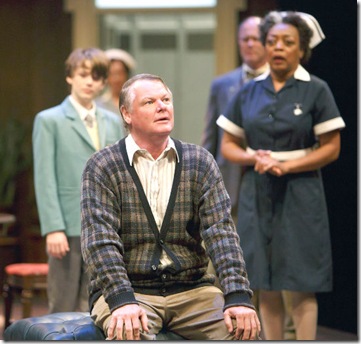Reviews from Stratford 2015: Durrenmatt’s “The Physicists” still works
Photo: David Hou
STRATFORD, Ont. — One thing is clear about the Stratford Festival’s revival of Friedrich Durrenmatt’s morbidly funny Cold War satire, The Physicists. It features a bouquet of outstanding performances. There’s a sly and knowing Graham Abbey, in a foppish display of bewigged and embroidered elegance, picking his way with cat-like tread through the role of an asylum inmate who claims to be Isaac Newton.
Then there’s Mike Nadajewski who cuts his own distinctive figure,courtesy of his rat’s nest mop of hair and the violin on which he keeps playing Beethoven’s Kreutzer Sonata. He thinks he’s Albert Einstein.Thirdly, we have the enigmatic figure of one Johann Wilhelm Mobius, a patient who can be reduced to trembling fear at one moment and driven
to murderous rage at the most. He’s the most troubling figure in the play, a man tormented by visions of King Solomon. He’s portrayed by Geraint Wyn Davies in one of the best performances of his career. There is also the smoothly malevolent presence of Fraulein Doktor Mathilde von Zahndm, the humpbacked, fright-wigged psychiatrist who has charge of them. Closer inspection reveals this to be actress Seana
McKenna relishing the opportunity to make like Richard lll. She also invokes James Bond territory, reminding you rather of Rosa Klebb, the lethal villainess of From Russia With Love; indeed all that’s missing are the knife blades springing from the toes of her shoes.
And oh yes, we mustn’t forget Randy Hughson, wonderful as a crusty cop who’s getting increasingly fed up over the number of nurses being murdered on site. Indeed, Miles Potter’s production engages our attention immediately
with the sight of a corpse on the floor of the asylum drawing room. It won’t be the last strangled victim we encounter — but we shouldn’t expect the frustrated police to bring the perpetrators to justice, given that the courts would deem them mentally unfit to stand trial.
There are, as we will discover reasons for these crimes — reasons that may seem entirely legitimate in the eyes of the characters responsible for them. In writing The Physicists, Durrenmatt was cunning enough to begin with an attention-grabbing set-up that employed some of the devices of the conventional mystery, and then to start throwing sardonic curve balls at those conventions. Canadian playwright Michael Healey’s deft new adaptation remains true to the sensibility of the original — consider the unpredictably of the witty and sometimes corrosive verbal byplay that enlivens the first act in particular, and the need to keep the audience somewhat off balance. Is this how things really are? Are any of these main characters really who we think they are?
The answers will be forthcoming as the play proceeds, and so will the play’s central dilemma. It asks a simple enough question: when should one be held accountable for one’s actions? But the answer is less simple. And the core of the play rests in the character of Mobius — a renowned physicist, a scientific genius so obsessed with the consequences on humanity of his discoveries that he has vowed to safeguard the world by simulating insanity and locking himself and the
fruits of his research within the walls of a sanitarium.
But there comes a moment with this production when we may find ourselves primarily appreciating the performances — particularly themoral anguish of Wyn Davies’ Mobius — and the sleek efficiency ofMiles Potter’s direction. We can also admire the look of theproduction — the plush, carpeted elegance of Peter Hartwell’s designconcept for the thrust stage of the Tom Patterson Theatre, coupled with costume designer Gillian Gallow’s penchant for the mildly grotesque. But at some point, we may have to ask ourselves — how much do we really care about the play itself?
The Physicists can seem something of a dated period piece now, theproduct of a Cold War paranoia that seems increasingly remote. (Italso comes from a time when society was less sensitive about usingmental illness as the basis for a dark comedy.) It was written in 1961under the shadow of The Bomb, at a time when nuclear annihilationseemed a genuine threat, and when members of the scientific communitywere engaged in furious debate about their degree of culpability in delivering the world such fearsome weapons of mass destruction.That debate surfaces in the second act of The Physicists, at a crucial moment when the true motives of all the key characters stand revealed.The actors are giving their best here, and some unsettling moments of relevance to our present do emerge — indeed, there’s a frightening bit
that reminds us of the true implications of Edward Snowden’s revelations.
Yet the debate itself — and remember it is a hugely important moral debate — doesn’t really catch fire. It becomes wearisome. A dedicated cast isn’t to blame: there’s only so much to do with a playwright who seemed perilously close here to going through the motions. The truth is that if you want a rigorous dramatic examination of the morality of
nuclear physics, you should turn to Michael Frayn’s Copenhagen. Meanwhile, Stratford is proving that The Physicists can still work —albeit from a more limited platform.
(The Physicists continues at Stratford to Sept. 20. Ticket information At 1 800 567 1600 or stratfordfestival.ca)
CASTING
Seana McKenna…………………..Fräulein Doktor Mathilde von Zahnd
Geraint Wyn Davies……………..Johann Wilhelm Möbius
Graham Abbey…………………….Herbert Georg Beutler, aka "Newton"
Randy Hughson……………………Richard Vos
